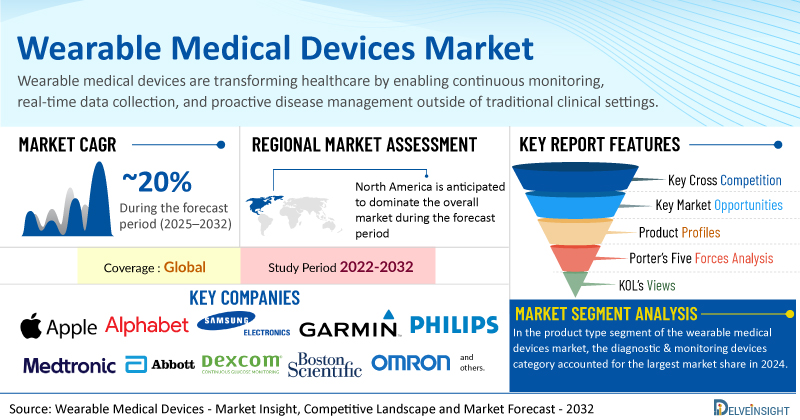
Global Wearable Medical Devices Market is Predicted to Reach USD 185 Billion by 2032 | DelveInsight
The global wearable medical devices market is experiencing rapid growth, driven by the increasing burden of chronic diseases, the adoption of remote patient monitoring, and swift technological progress. Equipped with compact sensors, AI-powered analytics, and 5G connectivity, these devices are transitioning from simple fitness trackers to vital healthcare tools that enable proactive and connected care. The global wearable medical devices market is experiencing rapid growth, driven by the increasing burden of chronic diseases, the adoption of remote patient monitoring, and swift technological progress. Equipped with compact sensors, AI-powered analytics, and 5G connectivity, these devices are transitioning from simple fitness trackers to vital healthcare tools that enable proactive and connected care.
The report highlights the escalating prevalence of chronic diseases worldwide as a primary driver. Conditions like diabetes, heart disease, and respiratory illnesses demand constant attention, and wearable medical devices offer a convenient and effective solution for managing these conditions outside of traditional clinical settings. These devices empower individuals to take control of their health by providing real-time data and insights.
Another key contributor to the market's expansion is the rising adoption of remote patient monitoring. Healthcare providers are increasingly turning to wearable technology to track patients' vital signs, medication adherence, and overall well-being from a distance. This is particularly beneficial for elderly patients, individuals with mobility issues, and those living in remote areas with limited access to healthcare facilities. Remote monitoring not only improves patient outcomes but also reduces the burden on healthcare systems by minimizing hospital readmissions and emergency room visits.
Technological advancements are also playing a pivotal role in the evolution of wearable medical devices. What started as simple fitness trackers are now sophisticated tools equipped with compact sensors, artificial intelligence (AI)-powered analytics, and lightning-fast 5G connectivity. These advancements enable devices to collect a wider range of physiological data, process it in real-time, and transmit it securely to healthcare professionals. AI algorithms can analyze the data to identify patterns, predict potential health risks, and personalize treatment plans, further enhancing the effectiveness of these devices.
The shift towards proactive and connected care is fundamentally reshaping the healthcare landscape. Wearable medical devices are no longer just gadgets; they are becoming essential tools for empowering individuals to manage their health, improving patient outcomes, and transforming the delivery of healthcare services worldwide. As technology continues to advance and adoption rates increase, the wearable medical devices market is poised for continued exponential growth in the years to come.